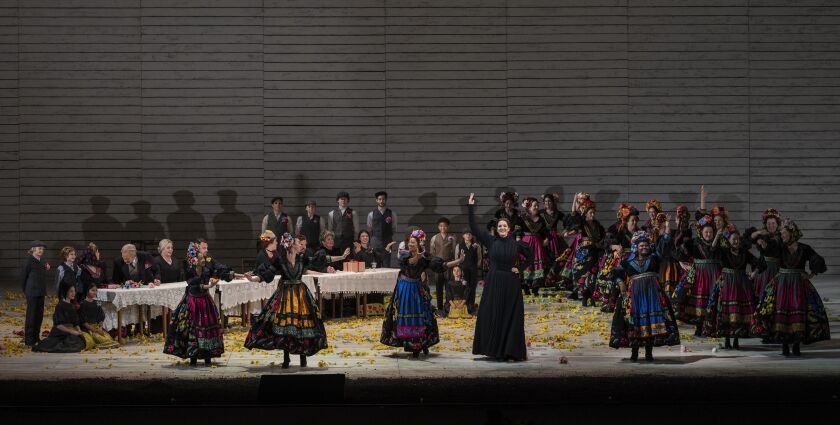A father’s dishonor, a vengeful knife attack and even a baby’s murder. “Jenůfa” easily could have been little more than a tawdry throwaway, but in the hands of Leoš Janáček, it becomes a deeply moving story of love, atonement and forgiveness.
Indeed, this 1904 opera by the still underappreciated Czech composer is one of the masterpieces of the 20th century. To its credit, Lyric Opera of Chicago presented this work in 1959 and 2000, and, the company has revived it a third time in a production that opened Sunday afternoon.
Unfortunately, the results are very much mixed. While there is much to praise about the performances, especially those of the two leading women, the exaggerated, expressionist staging is perplexing at best and sometimes even silly.
The story is set in 19th-century Moravia, a region of what is now the Czech Republic, where societal mores and religious dictates controlled all aspects of life, and a birth out of wedlock could lead to social banishment and lifetime shame.
Thus, when the opera opens, the pregnant Jenůfa (soprano Lise Davidsen) is desperate for her baby’s father, Števa (tenor Richard Trey Smagur), to marry her. But because he spinelessly abandons her, offering money and nothing else, Jenůfa’s stepmother, who goes by her title, the Kostelnička or village sacristan (soprano Nina Stemme), takes the extreme measure of killing the baby shortly after its birth.
In the production, which was created for the Royal Opera House in London, where it debuted in 2021, original director Claus Guth and set designer Michael Levine took this idea of societal repression to an extreme, setting the entire story in a prison-like box of slatted wood walls.
The notion of imprisonment is carried to ridiculous lengths in Act 2, when Jenůfa and the Kostelnička are shown living in a kind of centerstage pen constructed of metal bed frames, with mattresses weirdly heaped all around outside — these bed parts apparently symbolizing the title character’s damning sexual encounter. Even more bizarre, a performer costumed as a crow, a symbol of death and misfortune, climbs onto the pen at one point and hovers around the scene to no real point.
Among the many other questionable aspects of the staging are a series of bassinets suspended on cables in Act 1 like something out of a sci-fi movie. Or Guth’s compulsion to make the implicit explicit, like having a blood-smeared boy walk across the front of the stage to drive home the gruesome significance of the death of the baby, as though the audience couldn’t get that on their own.
In the end, though, the innate power of this redemptive story and Janáček’s beautifully expressive music, in the capable hands of Czech conductor Jakub Hrůša and the fine Lyric Opera Orchestra, rise above the stage direction.
Not as avant-garde as some of the composer’s later music though still forward-looking, the score is composed in a Post-Romantic style with a folk-tinged, Central European flavor. The accompaniment can be minimal, just a solo violin or xylophone, and sometimes the music drops away and the performer sings a cappella.
The production features the much-anticipated Lyric debut of Davidsen, one of the today’s top dramatic sopranos, in the title role and she does not disappoint. A multi-dimensional singer with depth and exceptional power across her entire range, she solidly anchors the production and conveys the character’s forlorn pain and loneliness with aching subtlety and authenticity.
The Norwegian singer is superbly matched by another Scandinavian and frequent collaborator, Swedish soprano Nina Stemme, who exhibits many of the same traits as Davidsen. She, too, has no shortage of vocal heft and interpretative nuance, potently conveying the stepmother’s anguish and moral conflict.
Smagur convincingly portrays the unseemly fear, fickleness and irresponsibility of Števa, and he delivers singing that is technically sound, but in the expanse of the Lyric Opera House, his voice comes off at times as thin and under-powered.
Making a stronger impression among the men is Czech tenor Pavel Černoch, who more than holds his own alongside Davidsen. He potently depicts the complexity and transformation of this central character, who is so jealous of Jenůfa’s love for his half-brother, Števa, in Act 1 that he slashes her cheek with a knife in a fit of rage.
It is the touching, perhaps unlikely and yet very human journey of Števa and Jenůfa, who find true love through forgiveness and acceptance, that turns what could have been just a grim and sensational story in something much more profound and enduring.







